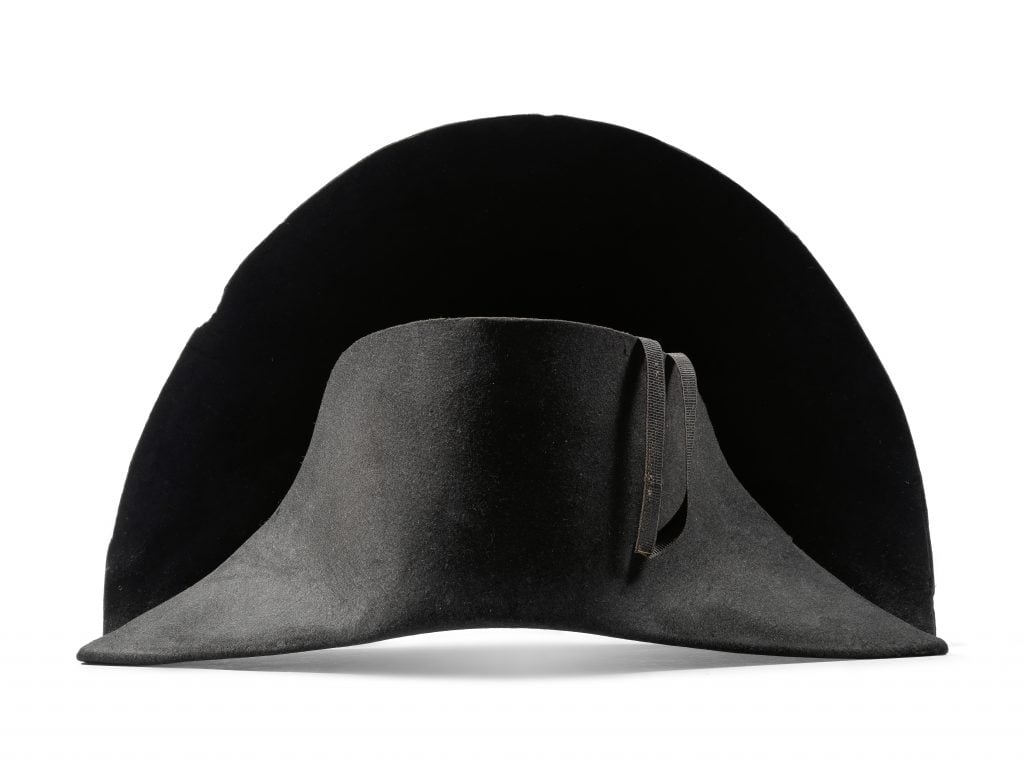Auctions
A Hat That Napoleon Wore During the Battle of Jena Just Sold for $1.4 Million at Sotheby’s
It’s the first of two hats worn by the emperor appearing at auction this fall.

It’s the first of two hats worn by the emperor appearing at auction this fall.

Taylor Dafoe

A bicorne hat that once belonged to Napoleon Bonaparte just sold for €1.2 million ($1.4 million) at Sotheby’s.
Believed to have been worn by the first French emperor on July 7, 1807, during a meeting with Russia’s Alexander I to sign the Treaty of Tislit, the object far exceeded its pre-sale estimate of €500,000–700,000 ($587,000–822,000).
The hat—which is actually the first of two bircornes owned by Napoleon set to come to auction this fall—highlighted a sale at the Sotheby’s Paris outpost dedicated to the historical figure on the bicentenary of his death.
Other objects in that sale included a pair of gilded bronze candelabras, which sold for €176,000; a set of a set of flintlock officer pistols, which fetched €126,000; and three separate locks of the emperor’s hair, the first two of which went for €18,900 and €13,860, respectively. The third, encased in an enamel brooch, did not sell.
#AuctionUpdate: Napoleon’s iconic bicorne hat just sold for more than €1 million in Paris. The special hat is thought to have traveled with Napoleon throughout his triumphant campaign of 1807 and was worn at the time of the Treaty of Tilsit. https://t.co/rIoPAuOhbF @sothebysfr pic.twitter.com/gugsCtOXTS
— Sotheby's (@Sothebys) September 22, 2021
Napoleon owned an estimated 120 bicorne hats during his emperorship, according to Sotheby’s, making it something of a trademark. Each was made by the same hatter and was constructed of black felt with the interior leather band made of silk, as Bonaparte was allergic to leather. The emperor hated wearing new hats and thus made his valet break them in first. Roughly 20 to 30 of these hats remain.
The example that sold today “was worn by the Emperor in 1807, for a period of 10 months which would have been during the battles of Iena, Friedland, and Eylaun—as well as at the Treaty of Tilsit,” Sotheby’s senior director Thierry de Lachaise explained in an email to Artnet News. “The next chapter in its story started when the Emperor left Dresden, and his valet gave the hat to Jean-Baptiste Kuhnel, concierge of the Bruhl-Marcolini Palace.”
From there, the object was acquired in 1814 by Sir Michael Shaw-Stewart, a Scottish aristocrat, for 10 thalers. “I will not say how much I would have given for it but having got it I know that no price would tempt me to part with it,” he recorded in his diary at the time. “I consider it as a most curious and interesting thing to be possessed of and I shall spare no care or expense to get it back home.”
The hat remained in Shaw-Stewart’s family until 2015, when it sold at Christie’s for £386,500 ($530,000) in 2015.

Napoleon’s black bicorne hat set to be auctioned off by Bonhams in October, 2021. Courtesy of the auction house.
Between then and now, the hat’s worth increased by 75 percent—a trend that will surely be welcome news to Bonhams, which plans to auction off a separate Napoleon hat next month.
That bicorne is believed to have been worn by the emperor in 1806, during the battles of Jena and Auerstadt, and even carried a trace amount of his DNA. A highlight of the auction house’s own Napoleon-themed event set for October 27 in London, that hat is estimated to bring in £100,000-150,000 ($140,000–210,000).
Additional lots of note in the forthcoming Bonhams Bonaparte bonanza include an ornate sabre that belonged to the emperor’s older brother, expected to sell for £250,000-350,000 ($340,000–480,000); an 1816 letter signed by Napoleon, estimated at £130,000-180,000 ($180,000–250,000); and an imperial gold snuff box, thought to be worth £60,000-80,000 ($82,000–110,000).